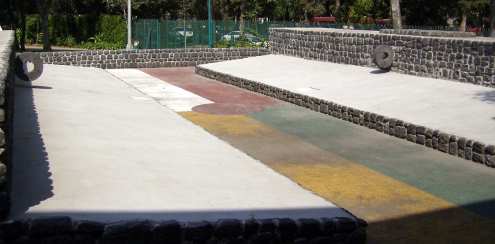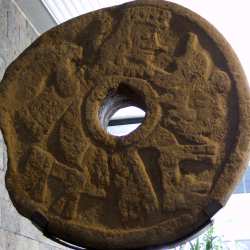Aztec Ball Game
The Aztec ball game was actually a revision of an ancient Mesoamerican game that was played by many peoples including the Mayans. It may have originated with the ancient Olmec civilization. It became a very important part of the Aztec Empire, not just as entertainment, but for political and religious reasons as well.
Let me ask you this - if you move into a new home, what do you do first? Put up a special picture? Plug in the stereo? When the Aztecs started a new settlement, there were two things they would do. First, build a shrine to the god Huitzilopochtli, and then build a ball court next to it. In Tenochtitlan it was surrounded by the palace and temple. The Aztec ball game, known as ullamaliztli, was a priority.

A sample ullamaliztli tlachtli (ball court)
(On display at Mexico's National Anthropological Museum, 2009)
The Aztec ball court
The Aztec ball game had a distinctive court known as the tlachtli or tlachco. The ball court was usually in the shape of an I, although there were some variations. Around the court was a slope, surrounded at the outer edge by walls about 8-11 feet high. The court was usually between 100 and 200 feet long, with a centre line, and six markers along the sloping walls. At centre court against the walls were two stone-carved rings, roughly 35 inches in diameter, often ornately carved in the form of an animal.
Surrounding the court were areas for spectators, nobles and judges. The structure would often include skull racks (tzompantli). These had a base with upright wood posts. Bars ran from post to post, adorned with the skulls of sacrifice victims. Sometimes the walls would show reliefs of the winners and losers of the past.
Equipment
The ball, or ulli, was made of hard rubber and weighed about 9 pounds. Due to the rough surface of the court itself, protective gear was worn by the players. Players wore deerskin guards for the chin, hip, thigh, hands, and cheeks. Even with this protection, players would end the game bruised and bleeding, since they often had to throw themselves to the ground.
The play
 An actual ring used in the ancient Mesoamerican ball game, Ullamaliztli (On display in Mexico City) |
The teams would face each other on the court. The object in the
end was to get the ball through the stone hoop. This was extremely difficult, and so if it actually happened the game would be over. In fact, according to historian Manuel Aguilar-Morenao, some courts didn't even have rings. Another important rule was that the ball was never allowed to touch the ground. Players couldn't hold or even touch the ball with their hands - only the elbows, knees, hips and head were used. As you may imagine, this made for a very fast paced game, and the players had to constantly throw themselves against the surface of the court to keep the ball from landing. The players were skillful, and the ball could stay in the air for an hour or more.
Because it was so hard to get the ball through the hoops, there were other objects as well. Players could hit one of the six markers along the sides of the court. Or, they would be given points for other skillful plays. Fouls were also given if the players couldn't get the ball across the centre line, or if they touched the ball with the wrong part of the body, such as the hand or calf.
During the Aztec ball game, gambling was common among the spectators. Gambling reached high levels in the Aztec empire. Just about anything could be gambled, from ornate feathers to land to children. It was common for a person to actually sell themselves into slavery in order to pay off the debt. This was voluntary slavery, with some parallels to the way someone today would work at a job he or she doesn't like for years just to pay off a debt.
Politics
With city-states and tribes playing against one another, it's not surprising that the Aztec ball game took on political significance. A win or a loss was very much taken to heart. At
times, the game would turn into an excuse for an assassination or
attack. The game might also be used to settle differences between two parties.
Huge wagers might be made by kings as well. A story is told of two kings, one wagering a garden, another wagering a marketplace. The marketplace was lost, but the winning king was assassinated when a contingency from the loser congratulated him. They gave him a garland, with a leather strangling cord hidden inside.
Religion
The Aztec ball game had a lot of ritual significance. It was mean to mirror the ball court of the heavens, this being
the ball court of the underworld where the sun passed each night.
The game represented the battle between day and night, and so
was also related to the human blood sacrifices that were intended to keep the sun moving in the sky. (Read
more about the Aztec sacrifices here)
It is said that the ball represented the head of a sacrificed victim. In Tenochtitlan, the ball court was at the foot of the blood
stained stairs of the temple, and the ball game itself would often be a scene of sacrifice. It is believed that the losing coach, or even the whole team, might be sacrificed. Some historians have disputed this - because it was an honour to be sacrificed, it may have been the winning team that lost their lives.
The Aztec Ball Game today
A form of the Aztec ball game is still played today, known as ulama. Ulama de cadera (hip ulama) is similar to the Aztec version of the Mesoamerican game, and also related are its cousins ulama de antebrazo and ulama de palo. You can read more about today's version of the Aztec ball game here.
Also, check out this article on ulama from the Archaeological Institute of America.
Many of the players are children, and ulama de antebrazo is often played by women. The Mexican state of Sinaloa is most known for the modern version of the Aztec ball game.
What other games did the Aztecs play?